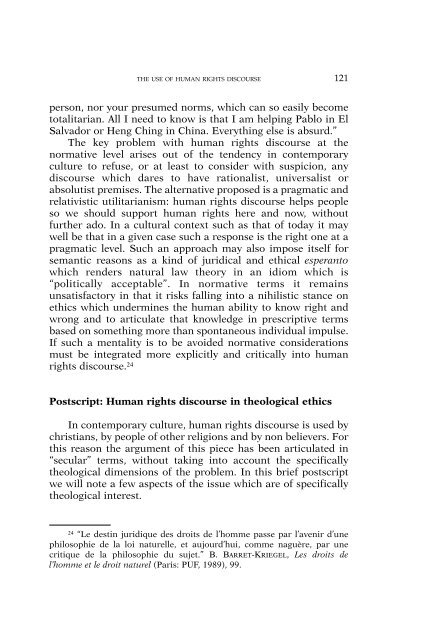Vol. XXXVIII / 1 - Studia Moralia
Vol. XXXVIII / 1 - Studia Moralia
Vol. XXXVIII / 1 - Studia Moralia
Create successful ePaper yourself
Turn your PDF publications into a flip-book with our unique Google optimized e-Paper software.
THE USE OF HUMAN RIGHTS DISCOURSE 121<br />
person, nor your presumed norms, which can so easily become<br />
totalitarian. All I need to know is that I am helping Pablo in El<br />
Salvador or Heng Ching in China. Everything else is absurd.”<br />
The key problem with human rights discourse at the<br />
normative level arises out of the tendency in contemporary<br />
culture to refuse, or at least to consider with suspicion, any<br />
discourse which dares to have rationalist, universalist or<br />
absolutist premises. The alternative proposed is a pragmatic and<br />
relativistic utilitarianism: human rights discourse helps people<br />
so we should support human rights here and now, without<br />
further ado. In a cultural context such as that of today it may<br />
well be that in a given case such a response is the right one at a<br />
pragmatic level. Such an approach may also impose itself for<br />
semantic reasons as a kind of juridical and ethical esperanto<br />
which renders natural law theory in an idiom which is<br />
“politically acceptable”. In normative terms it remains<br />
unsatisfactory in that it risks falling into a nihilistic stance on<br />
ethics which undermines the human ability to know right and<br />
wrong and to articulate that knowledge in prescriptive terms<br />
based on something more than spontaneous individual impulse.<br />
If such a mentality is to be avoided normative considerations<br />
must be integrated more explicitly and critically into human<br />
rights discourse. 24<br />
Postscript: Human rights discourse in theological ethics<br />
In contemporary culture, human rights discourse is used by<br />
christians, by people of other religions and by non believers. For<br />
this reason the argument of this piece has been articulated in<br />
“secular” terms, without taking into account the specifically<br />
theological dimensions of the problem. In this brief postscript<br />
we will note a few aspects of the issue which are of specifically<br />
theological interest.<br />
24<br />
“Le destin juridique des droits de l’homme passe par l’avenir d’une<br />
philosophie de la loi naturelle, et aujourd’hui, comme naguère, par une<br />
critique de la philosophie du sujet.” B. BARRET-KRIEGEL, Les droits de<br />
l’homme et le droit naturel (Paris: PUF, 1989), 99.
















